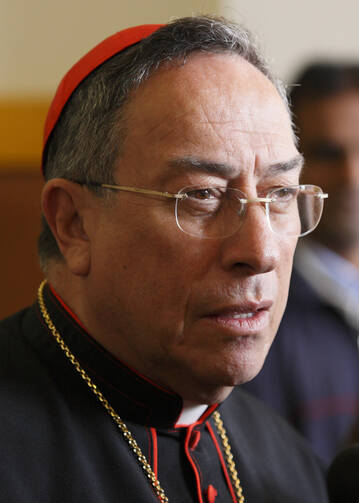Cardinal Oscar Rodriguez during the Q&A following his January 20th talk on “The Meaning of Mercy” at Santa Clara University.
INTERLOCUTOR: Pope Francis frequently offers a critique to world capitalism, free market economics and often refers to that as an unjust economic system. Sometimes it sounds like he may be arguing for a democratic socialism, sometimes it sounds like he’s arguing for a moderate capitalism. But it’s hard to place him in the context of economics. In the light of his vision of mercy would you have something to say about that?
Yes, yes. You know, when Pope Francis is criticizing it’s because the effects that this kind of economy is having on the poor of the world. Because you know it’s difficult here in the United States to consider that, because you live in a system, and to have the touch of other countries, it’s very difficult. It’s not the same when you watch that on TV as when you walk among them for instance in the refugee camps in Palestine, when you meet people there that have been all their lives in a refugee camp. You cannot imagine that unless you go and see and touch that kind of people.
This is why the Holy Father is making criticism to this kind of system that is excluding some kind of inhabitants of the world.
But he is also criticizing other economies, such as those of China for instance, or the Arab countries. It’s very complicated, very complicated. He’s not only criticizing this free market economy -- which is not free.
I have been working hard in that. When I started these dialogues with the Monetary Fund, they used to say priests do not know of economy. And I’d say but we know of humanity.
But the third time they told me priests do not know of economy I said they will never say that to me again. So I decided to study economy by myself and I did it. So in the dialogue they couldn’t tell me “You don’t know.” I know. I know.
And why we are trying to criticize is because we know from the bottom. There is no free market nowadays. And I have said that clearly in a meeting with the World Commerce Organization of the U.N. Those who were organizing the rounds of Uruguay in the past, now there are the rounds of Doha. But all that is vicious circles. They are not open to free market. There is no free market when there are subsidies to the economy or limitations in the economy.
When there was a big discussion about a manipulation in seeds for agricultural products, what happens? Monsanto, the biggest company in that area, were blocking, through the administration of the United States, to the exportations of iron from Europe. It happens all the time. There was a problem with Santiago de Chile, they were blocking the exportation of fruit. Wow.
There is free market for some places, but not for other places. And this is what is taking place already, and we have talked to that openly in these kinds of rounds in Doha.
They arrive to nowhere – because there is no will. There is always protectionism in some of the economies. And this is one of the reasons why it’s necessary to criticize these kinds of organizations. It’s necessary.
The G7 is closed. They look for their own interests. Then comes the rest of the world, but in first place comes these 7 countries. Russia used to be there; now it’s out.
When there would be free market, then could be more progress.
Economics is so complicated that we could spend a week, not only a couple of minutes here together. But you see for instance what happens to taxes in the world, what happens to that. It’s an issue that even the Catholic Catechism of the Catholic Church is saying, that people who do not pay taxes are going against their own conscience because it’s an obligation.
Well in some places there is a national sport to avoid paying taxes.
This is really really a concern, because it means that many times the conscience is not formed. This is a big problem.
See his entire talk here. (This portion begins at 80:15.)








